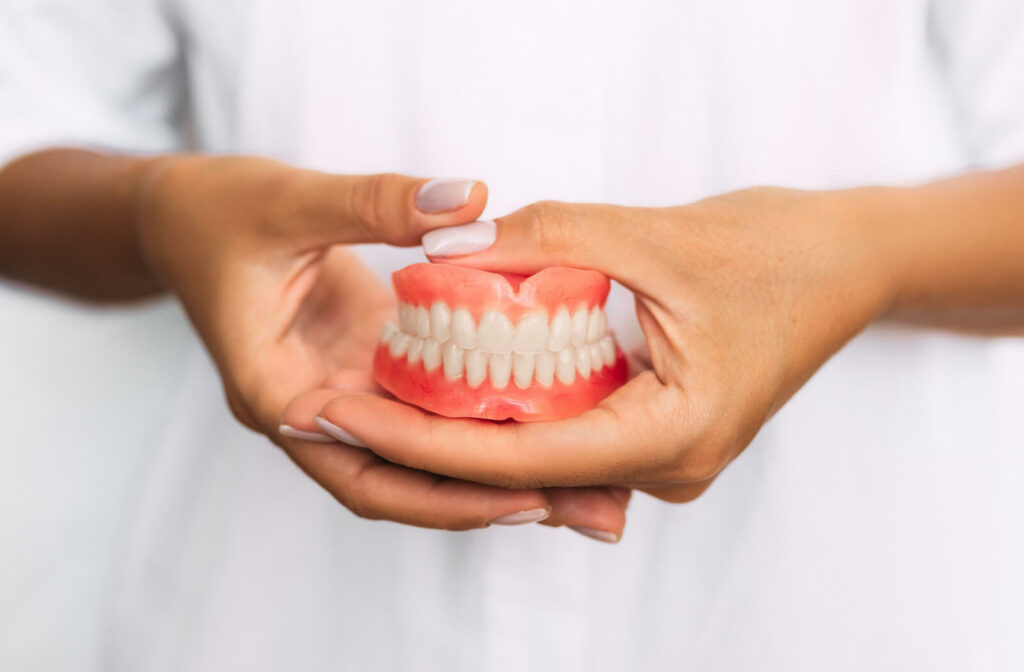Dentures are a popular treatment option for those who have lost all or some of their teeth. They can help restore oral function and enhance your smile, but they’re not a permanent solution.
How long your dentures last can depend on the type of denture, your oral hygiene habits, and how often you visit your dentist for regular dental exams and cleanings. Partial dentures can last approximately 5–10 years, and complete dentures can typically last 5–7 years before you may need a replacement.
What Are Dentures?
Dentures are custom-made appliances or artificial replacements for natural teeth and gums. Once you’ve had a dental exam, your dentist may recommend dentures if an injury, tooth decay, or other dental disease has left you with missing teeth.
Dentures can be beneficial for:
- Improving chewing function
- Enhancing your smile
- Improving your speaking abilities
Types of Dentures
There are several types of dentures. The type you choose can influence the lifespan of your specific dentures.
Partial Dentures
Partial dentures may be suitable when some natural teeth remain or when your remaining teeth aren’t strong enough to hold a bridge. Partial dentures can include 1 or more artificial teeth held in place by clasps that fit onto nearby natural teeth. You can remove partial dentures for cleaning.
Complete Dentures
Complete dentures may be suitable when all your natural teeth are missing. Complete dentures replace your entire arch of missing teeth and rest on the gums. They are usually held in place by suction.
Complete dentures can take time to get used to, but they are removable for cleaning at night and giving your gums a rest from wearing them during the day.
Overdentures
If complete dentures don’t work for you, we may recommend overdentures. Overdentures are removable dentures that fit or rest over your natural teeth. Overdentures can also attach to dental implants or small posts placed into your jawbone. Implant-retained dentures are removable.
The Lifespan of Dentures
While dentures have come a long way in terms of materials and techniques, the question of their durability still lingers. Generally, partial dentures can last 5–10 years, whereas complete dentures can last 5–7 years. The exact length of time your dentures last may be less than or greater than the average number of years.
Complete dentures may need replacing due to normal wear, age-related changes, and becoming loose. How long your dentures last can vary widely based on several factors, including the type of dentures you have, your oral hygiene habits, and how well you care for them.
What Are the Signs You Need New Dentures?
You should visit your dentist if you experience the following issues related to your existing dentures:
- Your dentures feel loose
- Your dentures hurt or pinch your gums
- There is a clicking sound when you speak
- Your dentures have damage or discoloration
- Your dentures are more than 10 years old
Caring for Your Dentures
Maintaining a proper care routine can increase the lifespan of your dentures. Here are some essential tips for caring for your dentures:
- Be gentle when handling your dentures, as they can be fragile. You can stand over a folded towel or a filled sink to avoid dropping them on a hard surface.
- Clean your dentures daily. Use a soft-bristle brush for cleaning dentures and a denture cleaner recommended by your dentist to remove food particles and stains. Avoid using regular toothpaste, which can be abrasive and damage your dentures.
- Soak your dentures. Dentures should be soaked overnight in a denture cleaning solution to keep them moist and prevent them from drying out and warping. Follow your dentist’s recommendations for the appropriate soaking solution.
- Avoid using hot water for cleaning, as it can warp dentures. Instead, use lukewarm or cool water to rinse or clean your dentures.
- Get regular dental checkups. Accidents happen, and dentures may occasionally break or become damaged. Visit your dentist if this happens. Routine dental exams provide an opportunity to catch potential damage early and confirm your dentures still fit properly.
Oral Health & Wearing Dentures
Caring for your oral health when wearing dentures is essential for maintaining the longevity and comfort of your dentures and supporting the health of your mouth and gums.
Here are some tips for caring for your oral health with dentures:
- Brush your mouth twice a day. Even with complete dentures, it’s crucial to maintain good oral hygiene by gently brushing your gums, tongue, and the roof of your mouth with a soft-bristle toothbrush.
- Clean your natural teeth thoroughly. Use a regular toothbrush and fluoride toothpaste with partial dentures. You can also floss between your natural teeth and under partial dentures to remove plaque and prevent decay.
Support for Your Overall Oral Health
The lifespan of your dentures can vary, but with proper care, maintenance, and regular dental checkups, you can extend their durability. While dentures may not last a lifetime, they can help you enjoy your smile and support your dental health for many years.
If you have concerns about missing teeth, book an appointment with Arch Dental Centres for personalized advice and recommendations for dentures based on your needs.


